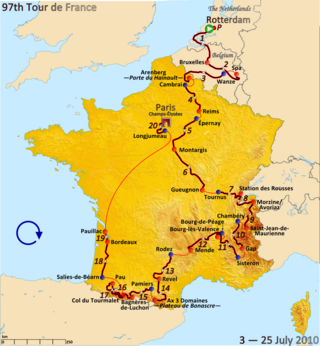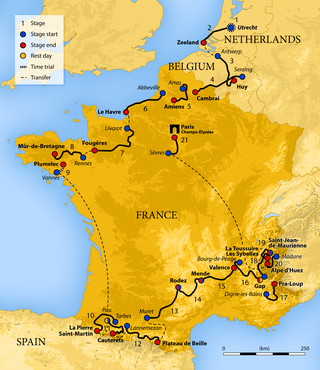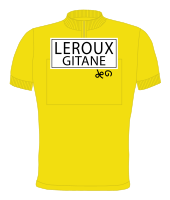
The 2000 Tour de France was a multiple stage bicycle race held from 1 to 23 July, and the 87th edition of the Tour de France. There was no overall winner following a vacating of results by the United States Anti-Doping Agency announcement on 24 August 2012 that they had disqualified Lance Armstrong from all his results since 1 August 1998, including his seven Tour de France wins from 1999 to 2005; the Union Cycliste Internationale confirmed the result.

The 2006 Tour de France was the 93rd edition of the Tour de France, one of cycling's Grand Tours. It took place between the 1st and the 23rd of July. It was won by Óscar Pereiro following the disqualification of Floyd Landis. Due to the United States Anti-Doping Agency announcing on August 24, 2012, that they had disqualified Lance Armstrong, a former teammate of Landis, from all of his results since August 1, 1998, including his seven Tour de France titles from 1999 to 2005, this is also the first Tour to have an overall winner since 1998. By terms of margin of victory the 2006 Tour was the 3rd closest of all time.

The 2007 Tour de France the 94th running of the race, took place from 7 to 29 July. The Tour began with a prologue in London, and ended with the traditional finish in Paris. Along the way, the route also passed through Belgium and Spain. It was won by Spanish rider Alberto Contador.

Christopher Clive Froome [kɹɪs fɹuːm], is a Kenyan-British professional road racing cyclist who currently rides for UCI ProTeam Israel–Premier Tech. He has won seven Grand Tours: four editions of the Tour de France, one Giro d'Italia (2018) and the Vuelta a España twice. He has also won several other stage races, and the Vélo d'Or three times. Froome has also won two Olympic bronze medals in road time trials, in 2012 and 2016, and took bronze in the 2017 World Championships.

The 2010 Tour de France was the 97th edition of the Tour de France cycle race, one of cycling's Grand Tours. It started on 3 July with an 8.9 km prologue time trial in Rotterdam, the first start in the Netherlands since 1996. The race visited three countries: the Netherlands, Belgium and France, and finished on 25 July on the Champs-Élysées in Paris.

The 2013 Tour de France was the 100th edition of the Tour de France, one of cycling's Grand Tours. It started on the island of Corsica on 29 June and finished on the Champs-Élysées in Paris on 21 July. The Tour consisted of twenty-one stages and covered a total distance of 3,403.5 km (2,115 mi). The overall general classification was won by Chris Froome of Team Sky. Second and third respectively were Nairo Quintana and the Team Katusha rider Joaquim Rodríguez.

The 2012 Tour de France was the 99th edition of the Tour de France, one of cycling's Grand Tours. It started in the Belgian city of Liège on 30 June and finished on the Champs-Élysées in Paris on 22 July. The Tour consisted of 21 stages, including an opening prologue, and covered a total distance of 3,496.9 km (2,173 mi). As well as the prologue, the first two stages took place in Belgium, and one stage finished in Switzerland. Bradley Wiggins won the overall general classification, and became the first British rider to win the Tour. Wiggins's teammate Chris Froome placed second, and Vincenzo Nibali (Liquigas–Cannondale) was third.

The 2014 Tour de France was the 101st edition of the race, one of cycling's Grand Tours. The 3,660.5-kilometre (2,274.5 mi) race included 21 stages, starting in Leeds, Yorkshire, United Kingdom, on 5 July and finishing on the Champs-Élysées in Paris on 27 July. The race also visited Belgium for part of a stage. Vincenzo Nibali of the Astana team won the overall general classification by more than seven minutes, the biggest winning margin since 1997. By winning, he had acquired victories in all Grand Tours. Jean-Christophe Péraud placed second, with Thibaut Pinot (FDJ.fr) third.

The 2015 Tour de France was the 102nd edition of the Tour de France, one of cycling's Grand Tours. The 3,360.3 km (2,088 mi)-long race consisted of 21 stages, starting on 4 July in Utrecht, the Netherlands, and concluding on 26 July with the Champs-Élysées stage in Paris. A total of 198 riders from 22 teams entered the race. The overall general classification was won by Chris Froome of Team Sky, with the second and third places taken by Movistar Team riders Nairo Quintana and Alejandro Valverde, respectively.

The 2016 Tour de France was the 103rd edition of the Tour de France, one of cycling's Grand Tours. The 3,529 km (2,193 mi)-long race consisted of 21 stages, starting on 2 July in Mont Saint-Michel, Normandy, and concluding on 24 July with the Champs-Élysées stage in Paris. A total of 198 riders from 22 teams entered the race. The overall general classification was won by Chris Froome of Team Sky, with the second and third places were taken by Romain Bardet and Nairo Quintana, respectively.

The 2015 Tour de France was the 102nd edition of the race, one of cycling's Grand Tours. The Tour started in Utrecht, Netherlands on 4 July and finished on the Champs-Élysées in Paris on 26 July. On 13 July, between stages nine and ten there was a rest day in Pau.

The 2017 Tour de France was the 104th edition of the Tour de France, one of cycling's Grand Tours. The 21-stage race took place across 3,540 km (2,200 mi), commencing with an individual time trial in Düsseldorf, Germany on 1 July, and concluding with the Champs-Élysées stage in Paris on 23 July. A total of 198 riders from 22 teams entered the race. The overall general classification won by Chris Froome of Team Sky, his third consecutive victory and fourth overall. Rigoberto Urán (Cannondale–Drapac) and Romain Bardet finished second and third, respectively.
The 2016 Critérium du Dauphiné was the 68th edition of the Critérium du Dauphiné cycling stage race. The eight-stage race began in Les Gets on 5 June and concluded in SuperDévoluy on 12 June, and is sixteenth of the twenty-eight races in the 2016 UCI World Tour season. The Dauphiné is viewed as a preview for July's Tour de France and a number of the contenders for the general classification of the Tour participated in the race.

The 2018 Tour de France was the 105th edition of the Tour de France, one of cycling's three Grand Tours. The 3,351 km (2,082 mi)-long race consisted of 21 stages, starting on 7 July in Noirmoutier-en-l'Île, in western France, and concluding on 29 July with the Champs-Élysées stage in Paris. A total of 176 riders from 22 teams participated in the race. The overall general classification was won by Geraint Thomas of Team Sky. Tom Dumoulin placed second, with Thomas's teammate and four-time Tour winner Chris Froome coming third.

The 2019 Tour de France was the 106th edition of the Tour de France, one of cycling's three Grand Tours. The 3,365.8 km (2,091 mi)-long race consisted of 21 stages, starting in the Belgian capital of Brussels on 6 July, before moving throughout France and concluding on the Champs-Élysées in Paris on 28 July. A total of 176 riders from 22 teams participated in the race. The overall general classification was won for the first time by a Latin American rider, Egan Bernal of Team Ineos. His teammate and 2018 Tour winner Geraint Thomas finished second while Steven Kruijswijk came in third.














